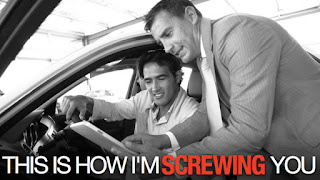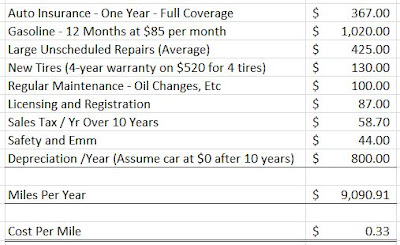JUST SHARING - Why Buying A New Car Feels Like Eating Asphalt, We help you to set realistic goals and accompany you through the journey to your destination. We have a lot of different topic, I hope this article about Why Buying A New Car Feels Like Eating Asphalt will be helpful.
Until now, you never knew how bad you were hosed on your last car purchase
 I work with a guy whose son just graduated high school. The boy earns probably a quarter of what I do by washing cars at a dealership downtown.
I work with a guy whose son just graduated high school. The boy earns probably a quarter of what I do by washing cars at a dealership downtown.Somehow, he managed to buy a brand new truck, currently valued at roughly what the down payment for my home would be.
This is no joke.
In my neighborhood, which is fairly modest, 20% down on the average home can be yours for the low price of $40,000.
That's what this recent high school graduate just spent on his new 2016 Ford Super Duty.
I couldn't believe it when I saw it. He couldn't possibly have saved up the money to purchase it outright--he's now got a buttload of debt he'll be sick and tired of paying for in just a few short months.
It's the dream of every teenager to own a truck like that, one which definitely didn't come true for me. Honestly, I didn't even own my own car until I was 21 and married--and that little "beauty" was a 10-year-old Pontiac Grand Am with 125,000 miles. I just sold it last year after owning it for seven years. It had about 187,00 when I sold it.
So while I could say it was my dream as a teenager to own a brand new car, it's not so much a dream today. Why is that? I've got a much greater perspective of auto ownership than I had back then.
I understand what true "ownership costs" mean for my bank account.
Auto ownership is expensive, deathly so
What's that perspective? Everything in life is expensive--so don't buy anything without figuring out to a "T" how much your purchase is actually going to run you. This is the key to A) Not getting ripped off initially, and B) Not going broke trying to make ends meet paying the various out of pocket costs.
 As I sat down the other day thinking about the recent expedient purchase of our new "family" vehicle, a 2010 Dodge Grand Caravan, which accommodated our growing family, I got to wondering what the true cost of ownership on that beast was--not to mention the one I had just sold, a much more expensive gas guzzling 2003 Dodge Ram pickup.
As I sat down the other day thinking about the recent expedient purchase of our new "family" vehicle, a 2010 Dodge Grand Caravan, which accommodated our growing family, I got to wondering what the true cost of ownership on that beast was--not to mention the one I had just sold, a much more expensive gas guzzling 2003 Dodge Ram pickup.Cost of ownership? What's that?
Surely you don't think that a car only costs you the amount you buy it for... right? Please tell me you're smarter than that.
Yes. The second you buy your first automobile, reality begins to hit you like a wrecking ball to the financial gonads. You begin to realize that there's far more to owning a car than simply signing on the bottom line. The true ownership cost is like an iceberg. Sticker price is just the tip of it. The ownership costs go so deep, you'll wish you could "unsee" them once you've taken a look!
To illustrate, let me provide the motherload of realities that begin to materialize once you enter the wonderful world of legally driving your own car:
- Auto Insurance
- Gasoline
- Major Repairs
- Minor scheduled Maintenance
- Tires
- Registration
- Safety and Emmissions testing (based on state)
- Sales tax on initial purchase
- Depreciation expense
All of these things pour into the ultimate cost of driving a vehicle down the road every day. You add up the amount of each of the above expenses coming out of your bank account each year, and divide the total cost by the number of miles driven that year, and you can arrive at a nice little number which tells you how much money you're torching per mile every time you make that extra, unscheduled trip to the grocery store because you didn't plan ahead.
I really wanted to nail down how much all of this costs for my situation, so I dug into my budgets for the past year to figure all of this out. Here are the stark, naked results for my current "sweet ride," my conservative 2004 Toyota Camry SE:
These are my total out of pocket expenses for one year of driving.
My methodology here was to add up the yearly expenses, and amortize any up-front costs, like sales tax and sticker price, over the period I plan on owning the car.
I looked back at the mileage I've put onto the vehicles I've owned over the past few years, and it looks like we've driven an average of 9091 miles in five years.
So I take the total expenses of $3031, divide by 9091, and arrive at a total cost per mile of $.33. A nice, odd number.
This is my operating cost, or in other words, my cost of ownership for every mile driven.
This seemed high, since I had always figured it cost me maybe 10 or 20 cents per mile to drive, based on gas mileage alone... but I got somewhat of a relief when I began to investigate what other drivers are paying.
What AAA says about average costs per mile for ownership
The American Automobile Association has a lot of great statistics on drivers in the US and their related financials.
They reported that in 2011, the average cost per mile for US drivers was around $.75. My costs are much lower than average--about 44% lower. Not surprising. I am, after all, the Village Id-Vestor.
But the next thing I looked at shocked me.
I just sold my man-machine, my 2003 Dodge Ram pickup, to buy our new family car, and I only owned it for roughly a year. In that short time, I estimate that I racked up about $3080 in total expenses, including a whopping $1800 in depreciation. That was by far the biggest expense, with sales tax coming in second at $587. I only drive it 3000 miles during that time.
My total cost of ownership to drive that beast for one year? I almost keeled over when I saw it.
$.9557 per mile. Almost three times the cost of my Toyota. But that's nothing compared to the neighborhood kid! Keep reading to find out what his cost of ownership is!
The morals of auto ownership to live by
What are the nuances we need to take away from this little exercise on cost of ownership?
- Hidden costs of ownership for ANY big-ticket purchase you make are rampant: homes, property, automobiles... even children. Don't ever think that "sticker price" is your actual cost.
- Shop around for your car. Make sure you get a good deal, so that if you're selling it down the road after only a short time, you won't get your face ripped off by depreciation, and end up selling the car for substantially less than you paid, or more than you owe on a loan, if you're financing the car--which I don't recommend
- Own a car for as long as you can, and don't buy one newer than 4-5 years. This ensures that the car is depreciated quite a bit, as far as market value is concerned. Owning it for a long time takes your cost of ownership down substantially, because you can depreciate the value of your car over a longer period, as well as the initial sales tax on the car. Shoot for ten years or more. Good vehicles will depreciate slowly after the initial few years, and last you well towards 200,000 miles.
- Cost of gasoline is usually the main performance factor taken into account when buying a vehicle these days, but the greatest cost buyers face, especially on new cars, is depreciation. A new car can lose 25% of its value the first year--that's like buying a $40,000 car, then lighting $800 on fire every month for a year and watching them burn. This is the sole reason you always need to avoid buying from dealerships, and NEVER buy a brand new car.
- The more miles you drive each year, the lower your "cost per mile" may seem... but don't be fooled. The more you drive, the more you have to pay in gas, maintenance, insurance, tires, repairs, and depreciation.
- And finally.....
If you do buy a BRAND NEW automobile, be sure you're willing to own it for at least ten years, or you will face the financial consequences of wealth destruction
Buying a car: The folly of youth
So, back to the "asphalt" thing... why is buying a new car as painful as eating asphalt? Because it hurts your bank account just as much as eating a mouthful of rocks would hurt your teeth.I really, really wish the neighbor kid knew what he was doing when he bought that huge money-sucker.
Just a year down the road, it'll be worth 25% less than what it is now. Five years from now? 75% less on average, according to Kelly Blue Book's average statistics.
He's unknowingly losing ten grand on that truck to depreciation over the next year. With his age and driving record, insurance will be at least triple what mine is, probably around the national average of $1006. Sales Tax will be five times what mine was. All things considered, I'm guessing he will be paying around $1.44 per mile he drives, or about 4.36 times what I will.
There's nothing like getting into debt when you're young, and not being able to get out of it.
This kid would be much better off, and much more satisfied about six months from now once that "new car euphoria" wears off, to have bought a nice, conservative car, saved money on insurance, gas, and taxes, socked away his money into his "freedom" account, and read a few of my articles on starting to invest and grow his money. I know, because I've seen this scenario play out in real life before.
I have a friend from high school who bought a nice little cheap Honda CRX when we were sophomores. About the end of our junior year, he was already tired of the "boring" little CRX which got 40+ miles per gallon, so he went out and upgraded his ride to an Acura Legend. Within a few short months, he was already feeling the pain of that upgrade, for all the reasons I've mentioned above.
If only I had personally known what I know now about money when I was 18, I would have made completely different decisions... and I'd be much closer to freedom today.
Use the "cost of ownership" for other purchases, too
The little exercise I've done today can be formed around any purchase you make. Don't think it's limited to automobiles. You can also use it to think of ways to "upgrade" your life by "downgrading" some of the expensive stuff in your life.If you did this little exercise on your own, I guarantee you'll think differently about things going forward. You'll probably be a little bit more upset about getting ripped off on your last purchase, too. But don't worry: the auto industry will get what's coming to them soon. Why is that?
I just read an article which tells us the auto industry is about to start experiencing some major financial issues.
You've heard about the subprime housing bubble from back in 2007-2008? Well, a subprime auto bubble has been forming for some time, and many dealerships have begun experiencing rising levels of default from sub-par borrowers. They're going to experience some major losses within the coming months in connection to this.
In addition, supply is waaaaayy up on vehicles sitting unbought in car lots, and consumer sentiment towards buying a vehicle is at a three-year low--meaning, record few people are thinking of buying a car in the near future.
If no one is buying cars, and there are lots of them sitting out there, the auto industry is about to get hosed on their earnings reports. Auto stocks are going into the red. Learn more about that here.
Live long and invest,
Jeremiah
Thanks for visiting my blog in title Why Buying A New Car Feels Like Eating Asphalt, Please Like And Share With Your Friends

